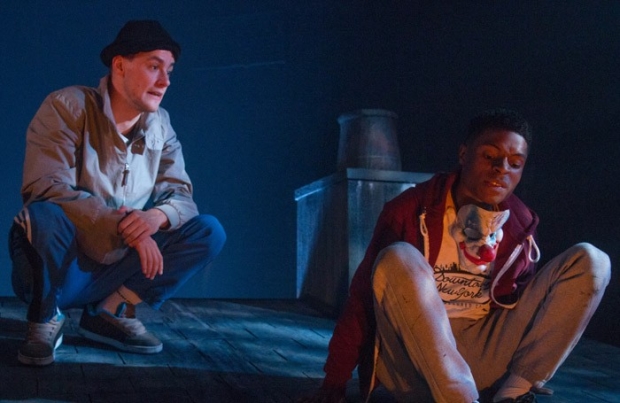Review: If We Got Some More Cocaine I Could Show You How I Love You (Old Red Lion)
John O’Donovan’s play sees two criminals open up to each other as they find themselves stuck on a roof following an aborted getaway

Mikey and Casey might be partners in crime, and John O’Donovan‘s first full-length play might be a robbery romance. Marooned on a rooftop, hiding from police after a burglary spree, the two men – lovers – slowly open up to one another.
Set above Ennis, a depleted small town in the west of Ireland, hit hard by the country's financial crisis, O’Donovan’s play shows how the recession has turned people on one another. Not only have the pair robbed an old schoolmate of Mikey’s at a petrol station, they’ve broken into Casey’s own home, nicking his mum’s money and his stepdad’s stash of coke. Both have been bashed about by it. Mikey (Alan Mahon) has had run-ins with the law before, and taken beatings for his sexuality, and Casey (Ammar Duffus), a black Londoner whose family relocated from Croydon, faces casual racism on a daily basis. He’s sporting a black eye, the work of his stepdad.
But stuck up on the slates after an aborted getaway, their noses numb, their hearts racing, it’s like they’re temporarily free from it all. At first, they’re on edge – talking in fraught whispers and peering over the guttering at the police below – but as the danger subsides, they settle into an honest, surprisingly gentle exchange. They swap school stories and, against the masculine norm, share their feelings, about life and about each other. It’s like up here, unseen, they can be vulnerable. It’s telling that they arrive with masks – balaclava for Mikey, clown face for Casey – but then reveal themselves.
It’s not just that O’Donovan’s play empathises, detailing the mitigating circumstances and background info behind two criminals. More than that, it’s a play that sees the good – in people, in places, in life. The simple act of allowing two criminals such a tender exchange, one that flirts around the edges of real love, is a political one. It counters all the usual portrayals and perceptions. So easy to write such young men off; to damn them by their deeds and forget about their hearts, hopes and hurts.
Ennis, too, is the sort of empty, old town too easily dismissed. Other plays would christen it a shithole and be done with it. O’Donovan looks at the urge to leave. Its young flee to Dublin to do degrees, just as Casey’s family left London. These two are on the run when forced to stop, and, up on the roof, O’Donovan finds the romance in Ennis: the River Fergus that winds behind the school, the steeples that shape its skyline. Casey remembers Croydon: the way the setting sun caught a nearby tower block for an hour each day. The title reminds us that everything is subjective. You have to see the good, but that entails being in a place to see it. Not everyone is.
Not that O’Donovan romanticises everything; he’s sharp on experiences of outsiders and poverty, just without letting it colour everything. His inexperience does show through though. For all director Thomas Martin wrings real pulse-racing trepidation from the scenario, you do spot the writer engineering ways to keep his characters stuck in situ, and both young man are overly emotionally articulate. Not only do they know themselves too well, they rarely struggle with the sexual tension of the moment; the tongue-tied difficulty of finding yourself alone with someone you really, really fancy. Without the will-they-won’t-they dance, the fumblings towards expressing their feelings, the tension can slacken off. Nonetheless, its meditative side comes out beautifully, heightened by Georgia de Grey’s beautiful rooftop design and Derek Anderson’s lush lighting, as two drifters share something up on the roof.
If We Got Some More Cocaine I Could Show You How I Love You runs at the Old Red Lion until 24th September.












